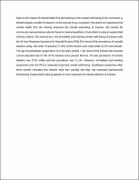Impact of Mental Health Training on Mental Well-being of Lay Counselors in Northern Uganda
Date
2018Author
Oboke, Henry
Abio, A
Kaducu, Ocaka F
Sodemann, M
Elklit, A
Ovuga, E
Metadata
Show full item recordAbstract
Data on the impact of mental health first aid training on the mental well-being of lay counselors is limited despite a wealth of research on the training of lay counselors. We tested the hypothesis that mental health first aid training improves the mental well-being of trainees. We trained 60 community representatives selected based on desired qualities in Gulu district using an experiential training method. We assessed pre- and immediate post training mental well-being of trainees with the 32-item Response Inventory for Stressful Events (RISLE) in terms of the prevalence of suicidal ideation using. Just under 78 percent (77.8%) of the trainees were male while 22.2% were female. The age of participants ranged from 22 to 62 years (media = 32). Each of the trainees had received a level education but 57.9% of the trainees were peasant farmers. Pre-test prevalence of suicide ideation was 9.3% while post-test prevalence was 11.1%. However, immediate post-training assessment with the RISLE indicated improved mental well-being. Qualitative assessment after three months indicated that trainees were less suicidal and they had improved psychosocial functioning. Experiential training appears to have improved the mental wellness of trainees.
Collections
- Research Articles [54]

